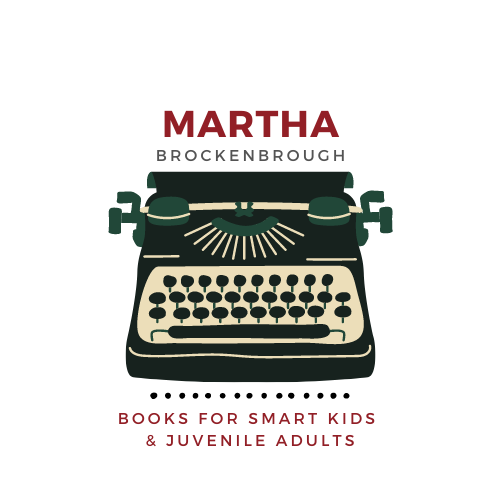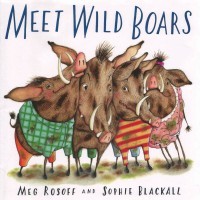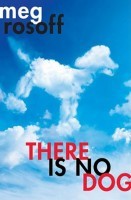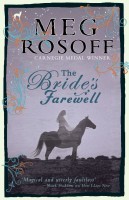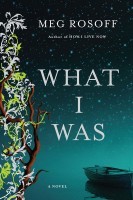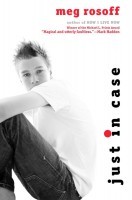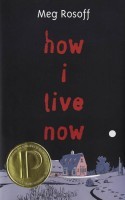 Plenty of people labor under the idea that books for young readers must be simple and adorable, all the better to match the adorable simplicity of childhood. There's much to enjoy about books in this vein, of course.
Plenty of people labor under the idea that books for young readers must be simple and adorable, all the better to match the adorable simplicity of childhood. There's much to enjoy about books in this vein, of course.
But there's this truth: for many of us, childhood is neither adorable nor simple.
So we can thank the dog* for Meg Rosoff, who writes bold, weird, dark, and wonderful books for young readers.
Her style is unique. Her stories are grim, complex, and hilarious as they explore war, incest, sexual identity, religion--a Pandora's box of subjects far removed from the usual young reader fare. And she does it incredibly well. Among her honors are a Printz Award and a Carnegie Medal. And How I Live Now, which won the Printz, will be a movie starring Saoirse Ronan.
She'll give a keynote address at the SCBWI Winter Conference in New York (Feb. 1-3). The early-registration discount is still available. I was thrilled to ask her a few questions about the writing life.
What's your writing process like? Do you know where your stories are going when you start, or do you surprise yourself along the way?
My writing process is difference with each book. With How I Live Now it just flowed out all of a piece as fast as I could write it down. With Just in Case, I thought I was a one-trick pony and couldn't get it to work -- when I submitted a draft to my editors in the US and UK, they both rejected it. They didn't say, "Gosh Meg, you've already written a bestseller, I'm sure this one will be fine once you finish it," they said, "No. Please go away and never darken our door again." Not even, "Go back and work on it more." Just no.
So I was quite pleased when that one won the Carnegie prize, but god, it was a long slog. With How I Live Now I had an idea where it might end, but with Just In Case I was dancing on coals the whole time without a clue. I wrote and rewrote and rewrote. And cried. And it came out OK in the end, which was a massive learning experience about the different ways to write a book. But I'm not sure I enjoyed writing it. OK, it was awful.
What I Was was fairly easy, though I wove a new character in quite near the end of the process to keep it from being a two-character story. The Bride's Farewell refused to work for so long that I started to panic, and then a great writer friend (who hadn't read it) gave me a general piece of advice from fairy tales, and the whole book snapped together like a Rubik's Cube (old person alert). From 2-D to 3-D in a couple of days. The fairy tale secret: take one of the children out of the family -- make him/her a cuckoo in the nest. I did that with Bean -- made him a foundling or possibly a half-brother, and the whole book started to make sense. Magic!
There is No Dog was just a bastard to write. I like to think I was distracted by falling in love with horses, but who knows. It was so hard I had to lie down in a dark room for months after it finished. And the one that's out next year wouldn't start, but from the afternoon I started writing, it flowed out like music. But that one (Picture Me Gone) involves a mystery of a man who runs away from home, and I didn't know why he-done-it until about the 6th draft. So it's not, um, shall we say, straightforward. I'm definitely a groper-in-the-dark.
Holy cow but your stories are courageous. I don't want to spoil things for readers who haven't read all your titles yet, but you've dealt with war, with sex boundaries, with religion. What is it about difficult topics that attracts you?
I don't set out to deal with "difficult" subjects. I'm just interested in the things that puzzled me as a kid, in my teens, 20s, 30s, in my 40s. Now. Why do people fall in love and why do they not....why do some people believe in god (I never did). Why are some people straight and some gay? Where does identity come from? How do you know who you are? How do you find out? Why does my mother say no one will marry me if I don't wear more pink? (not that I hold a grudge)
All the subjects that I found so difficult during my adolescence (which is still trundling on to an embarrassing extent in my, ahem, 50s) like family ties, and chemistry, and gender, and what saves people from themselves....I had such a long struggle to see life in focus that I'm a bit obsessed with the struggle.
Imagine taking violin lessons from someone who just found playing effortless from the age of three -- they'd say "but just play! It's easy!" Whereas I can remember every miraculous insight, every epiphany, every mystery, slowly and arduously coming into focus. All the aha moments. I've come to life the hard way, I suppose. I wasn't born understanding the difficult stuff and i never trusted the experts after the big Santa Claus lie, so I've spent a lot of time grappling. You have to grapple with your brain if you grow up in the suburbs or you turn into a zombie. Writers are naturally questioning, fairly dark people.
What have you learned along the way that you wish you knew when you started?
I've learned that there are lots of ways to write a book. That the books I loved 20 or 40 years ago are the ones I still love. That in order to write well, you have to be patient and persistent and connected with your subconscious. That you have to write for yourself and hold your corner -- always listen but don't always take advice. That the best books aren't necessarily the ones that sell best. But in a way, it was easier when I started. I knew nothing except that I loved books and wanted to write one that wouldn't inspire contempt in my friends.
Speed round: Chocolate or vanilla; early to bed or early to rise; hardback or ebook?
Vanilla by a zillion miles, don't like chocolate much. Early to bed and late to rise. Hardback, if the book is worth reading.
* Alas, I have just been informed There Is No Dog.
A sampling of Meg's books (she writes YA and picture books)
